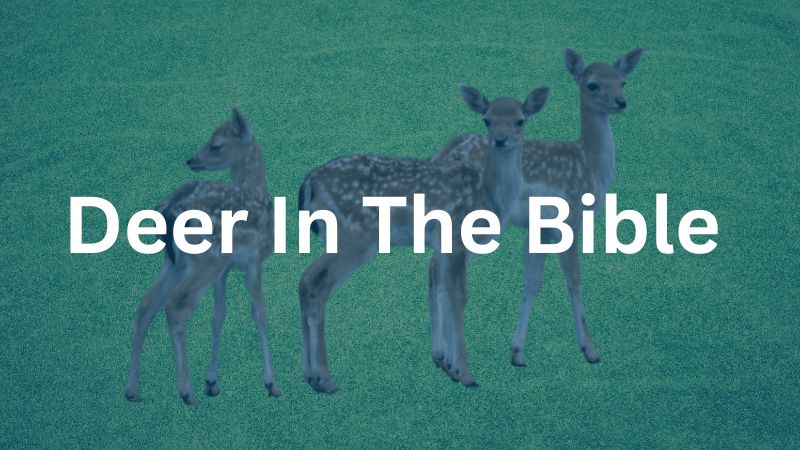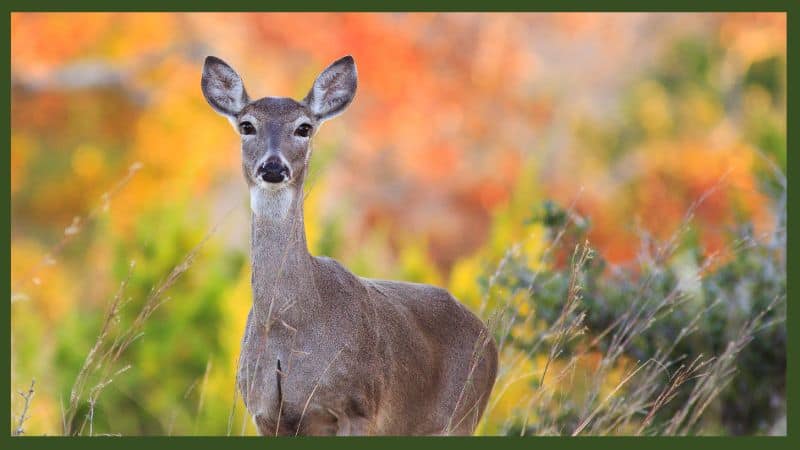When you think of a deer, you probably don’t think of it in biblical terms. However, you will find various mentions of deer in the Bible.
Various individuals who think of a deer will have multiple thoughts. You may imagine a deer that is gracefully running through the woods, beautifully and swiftly. You may see it as such a beautiful animal and you could never imagine doing anything to harm it.

Looking from a different perspective, a person might be a hunter. The deer may fall at the hand of the hunter as he provides food for his family. However, the hunter can also see the deer as one of God’s beautiful creatures and also have the appreciation that God has also provided the deer for the physical sustenance of men and women.
There is nothing wrong with either of those viewpoints. Both can honor the beautiful animal from different perspectives. And, yes, deer are beautiful creatures, but they are not only that. They hold spiritual significance in the pages of the Bible.
So, let’s take a look at deer in the Bible. Let’s look at them from a scriptural perspective, how the image of the deer is used, their meanings, and how they can help as an illustration in our spiritual journey.

Various Terms for Deer In the Bible
Although we will look at more of these later on, be aware that there are various words that may be used for the word “deer” in the Bible depending on what translation of the Bible you might be using. For instance, in the verse we will begin with below, let’s compare Psalm 42:1 in the King James Version (KJV) and the New International Version (NIV).
- New International Version (NIV): “As the deer pants for streams of water, so my soul pants for you, my God.”
- King James Version (KJV): “As the hart panteth after the water brooks, so panteth my soul after thee, O God.”
As you can see, the NIV uses a more modern word, “deer,” whereas the KJV uses the word, “hart.”
With that little caveat, let’s move ahead.
Deer In The Bible – A Soul that Pants – The Spiritual Thirst
“As the deer pants for streams of water, so my soul pants for you, O God.”
Psalm 42:1
For another example of deer in the Bible, this verse comes from a passage from Psalm 42 attributed as a “Maskil of the sons of Korah” which is an incredible Psalm of honesty and openness to God. A Maskil is interpreted as a “skillful song” and this one certainly qualifies!

The deer in the context of this passage symbolizes a person who has a deep longing and their soul thirsts for a relationship with the living God, just as a deer pants for water. God’s people have a deep yearning for something (Someone) vital to their existence and we long for God’s presence.
Obviously, water is essential to the survival of a deer – to the survival of us all. Therefore, the psalmist uses this imagery to express our need for God.
The verse captures the essence of spiritual thirst. Just as the deer pants for water brooks, the soul of the believer “pants” or yearns for a deeper connection with God.
The psalmist is describing a spiritual dryness, perhaps a time of difficulty or distance from God, and the urgent need to experience God’s presence once again.
Emotional Depth
The chapter continues to explore emotional and spiritual turmoil, mentioning tears and a sense of despair. The psalmist wants to know why his soul is so downcast. Have you been there before? I have.

He comes to the conclusion that he will praise God no matter even when he is downcast, which is a lesson to us. Yet, the starting point remains that poignant image of the deer, reminding us that true spiritual peace can only come from God, the living water.
Deer In the Bible: An Unlikely Reference From the Prophet Habakkuk
“The Sovereign LORD is my strength; he makes my feet like the feet of a deer.”
Habakkuk 3:19
Here is a mention of a deer in the Bible in an unlikely reference. The prophet, Habakkuk, is crying out to God under the looming threat of a Babylonian invasion. Therefore, it certainly looks like the times are going to be tough. As he turns to God in prayer, he acknowledges God’s sovereignty, God’s power, and His great works of the past.
The prophet is not simply looking from a worldly perspective, but is peering deeply into the spiritual world and gleaning the spiritual meanings of what God has done and will do.
So, where does the imagery of the deer fit into all of this? Well, Habakkuk knows God and knows Him well. He trusts that no matter the situation or outcome, he can trust God. He says that in whatever happens…
18″yet I will rejoice in the Lord,
I will be joyful in God my Savior.19 The Sovereign Lord is my strength;
Habakkuk 3:18-19
he makes my feet like the feet of a deer,
he enables me to tread on the heights.”
A deer is swift and sure-footed. A deer’s feet can make the right move at the appropriate time. Habakkuk trusted that God would give him the inner strength and surefootedness that he would need in the future.
Love and Attraction – A Loving Deer and a Graceful Doe
18 Let your wife be a fountain of blessing for you.
Proverbs 5:18-19
Rejoice in the wife of your youth.
19 She is a loving deer, a graceful doe.
Let her breasts satisfy you always.
In another example of deer in the Bible… there is no blushing needed here because this is a writing about the love and attraction between a faithfully married couple. The chapter has warned against infidelity and fleeing immorality.
Here again, the scripture uses the symbolism and beauty of a deer, a loving doe as the wife- and that a man should be captivated by her love and be satisfied with her. So, here once again, we find the deer as a symbol of something that is so beautiful in this life.
The Transformative Power of God – Leaping Like a Deer in Isaiah 35:6
Then will the lame leap like a deer,
Isaiah 35:6 NIV
and the mute tongue shout for joy.
Water will gush forth in the wilderness
and streams in the desert.
Here we find another mention of deer in the Bible as we see Isaiah using the deer to illustrate the miraculous transformations that God can bring about in the lives of the faithful. We can peer into the New Testament and see the lame man leap when he is healed by the power of God through the Apostle, Peter.
He leaped for joy and praised God when he was made spiritually whole AND was able to physically walk. If you’ve ever seen the beauty of the leap of a deer, it can be incredible. But how much more so if a man who could not walk was miraculously healed by the power of an almighty God?
Also, in this passage, we will find reference to those who were once mute to be able to shout for joy. Just as the lame may leap like a deer when they become healed, so shall the mute person shout and sing and praise God when He delivers them from their disease or weakness.
32 While they were going out, a man who was demon-possessed and could not talk was brought to Jesus. 33 And when the demon was driven out, the man who had been mute spoke. The crowd was amazed and said, “Nothing like this has ever been seen in Israel.”
Matthew 9:32-33
Other Animals in the Bible That Are Considered Deer or Having Deerlike Qualities
Although the word “deer” in the Bible which we are very accustomed to, does appear in scripture, there are other terms for animals in the Bible that are considered to be deer in the Bible or have very similar deerlike qualities. Here are a few of those.

Hart: This is an old term often used to describe a male deer, especially a red deer. This term is generally found in the King James Version of the Bible
Hind: This term usually refers to a female deer in the Bible. This is used in the Habakkuk passage we looked at before as in “hinds feet.”
Roe: This term can refer to a small species of deer. The term roe is used in the King James Version, but many of the modern translations use the term “gazelle” instead.
Gazelle: This is another very graceful term that is used in a similar context as a deer might be. The choice to use “gazelle” is often made to better capture the cultural and natural environment described in the original text.
The translators of the various versions of the Bible used the animals that they considered the best interpretation from the original language into English and sometimes they seemed to have arrived at different conclusions.
However, the points remain and it does not change the meaning of any scripture passages that include deer in the Bible.
For example, in the Song of Solomon 2:9, the King James Version uses “roe” or “young hart,” whereas the New International Version (NIV) and the English Standard Version (ESV) use “gazelle” or “young stag.”
All these terms—roe, hart, gazelle, and stag—refer to similar types of agile, graceful animals and serve as symbols of beauty or swiftness. Gazelles are more commonly found in the landscapes of the Middle East where the biblical stories are set, making them a more contextually appropriate animal to mention in some cases.
The Deer As Clean Animals Under the Mosaic Law
In the Old Testament, deer are classified as “clean” animals, suitable for consumption according to Hebrew dietary laws. This clean status elevates the deer’s symbolic importance, aligning it with themes of purity, holiness, and spiritual well-being.
Deer were, and are agile and graceful creatures. They represent virtues like innocence and gentleness or serve as spiritual metaphors. However, it is factual that the deer is an animal that was considered suitable for the Children of Israel to consume for food.
Wrapping it up
Well, there are just a few facts about deer in the Bible. There are actually quite a few animals mentioned in the Bible. However, the deer’s graceful presence in the Bible serves as more than just poetic imagery. It’s a rich symbol that speaks to us and can illustrate biblical principles on several levels.
Whether portraying spiritual thirst in the Psalms, sure-footed faith in the midst of adversity as in Habakkuk, or love and attraction in Proverbs and Song of Solomon, the deer remains a vivid reminder of the divine qualities that can only come from a relationship with the living God.
So the next time you come across the word “deer” or its synonyms in your biblical journey, take a moment to consider the symbolism packed into this seemingly simple term. It just might deepen your understanding of the scripture you’re reading, while illuminating a path to a more spiritually fulfilling life.
Additional Resources
Links to Other Bible Verses with deer or similar animals:





Leave a Reply